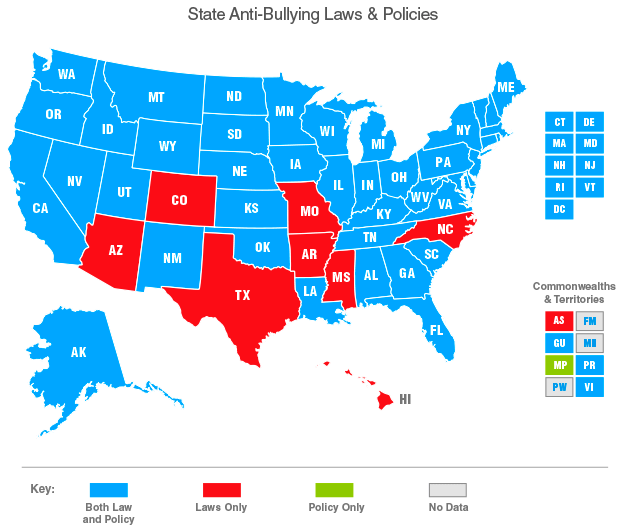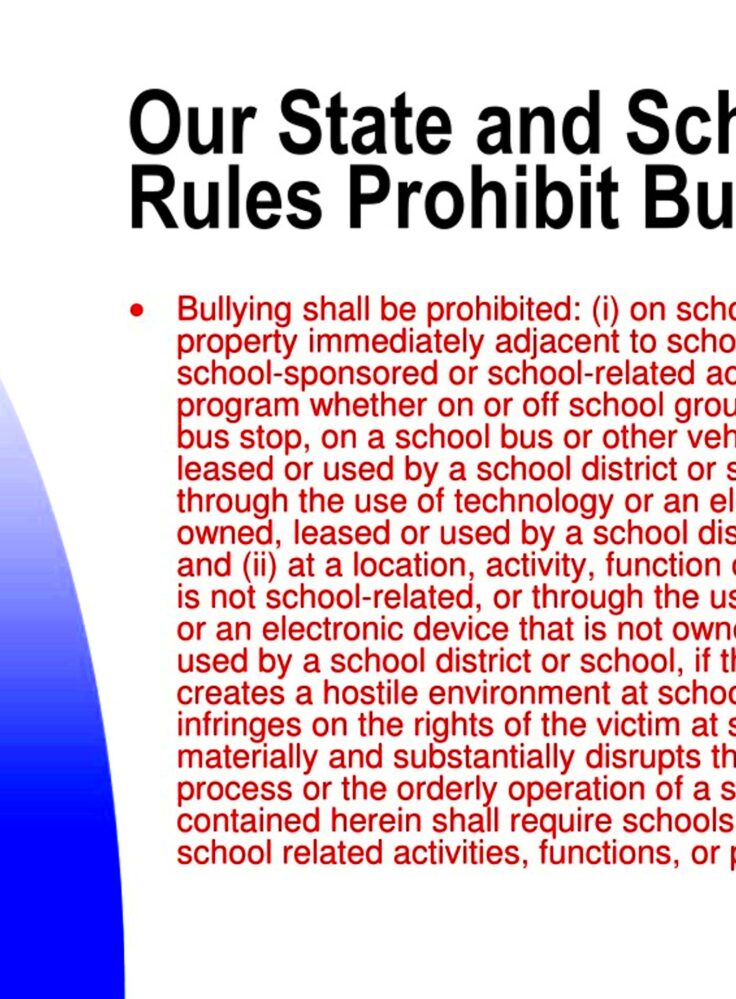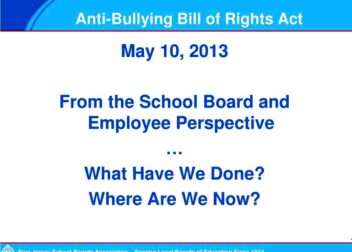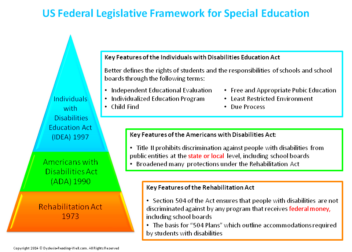Pennsylvania’s Anti-Bullying Laws for Schools
In Pennsylvania the matter of bullying in schools is treated with utmost seriousness showing a deeper commitment to ensuring the well being and safety of students. As a parent I remember feeling uneasy about sending my child to school not only due to academic concerns but also because of how they might be treated by their peers. This worry is precisely why Pennsylvania has established anti bullying laws designed to foster a safer atmosphere for students. These regulations mandate that schools implement policies and protocols to tackle bullying in an efficient manner.
Key Provisions of the Law

A key feature of Pennsylvania’s anti bullying legislation is the requirement for public schools to implement an anti bullying policy. This policy should clarify the definition of bullying establish protocols for reporting incidents and specify the actions schools will take to address such conduct. Here are some of the important elements.
- Definition of Bullying: The law provides a clear definition of bullying, including physical, verbal, and cyberbullying.
- Reporting Mechanisms: Schools are required to have a system in place for students and parents to report bullying incidents anonymously if desired.
- Investigative Procedures: Schools must investigate reported incidents promptly and take appropriate action to address and resolve them.
- Preventive Measures: The policy must include strategies for preventing bullying, such as educational programs and awareness campaigns.
These measures aim to implement a strategy to address bullying by making it an integral aspect of the schools environment rather than merely responding to incidents as they occur.
How Schools Must Respond to Bullying

When bullying happens Pennsylvania schools need to respond quickly and efficiently. Based on my personal experiences and what I’ve seen the effectiveness of the response can greatly influence how things play out. Schools are expected to take a approach to handling such situations.
- Immediate Action: As soon as a bullying report is received, the school must take immediate steps to ensure the safety of the victim and prevent further incidents.
- Investigation: The school must conduct a thorough investigation into the allegations, which includes speaking to all parties involved, including witnesses.
- Disciplinary Measures: Depending on the findings, appropriate disciplinary actions should be taken against the perpetrator, which could range from counseling to suspension.
- Support for Victims: Schools should provide support services to victims, such as counseling and peer support programs, to help them recover and feel safe.
I believe that the impact of these reactions can differ significantly. It’s essential for educational institutions to uphold not just the legal requirements but also the underlying principles, to make sure that every child is treated with respect and safeguarded.
Protections for Victims
When bullying happens it’s the victims who often carry the heaviest wounds. As a parent I’ve witnessed the impact bullying can have on kids well being. Pennsylvanias laws provide safeguards to help victims restore their sense of safety and self respect. These safeguards focus not, on addressing the situation but also on providing ongoing assistance.
- Confidentiality: Victims have the right to report bullying confidentially. This is crucial as it encourages more students to come forward without fear of retaliation.
- Support Services: Schools are required to offer counseling services and psychological support to help victims cope with the emotional and psychological effects of bullying.
- Safe Learning Environment: Victims must be provided with a safe and supportive learning environment. This means taking steps to prevent further bullying and ensuring the victim can continue their education without fear.
- Monitoring and Follow-Up: Schools should continuously monitor the situation to ensure that the bullying has ceased and the victim is adjusting well.
Based on what I’ve been through I can say that these actions can really have an impact. Making sure that survivors feel backed up and listened to is crucial for helping them heal and regain their self assurance.
Responsibilities of Parents and Guardians
The involvement of parents and guardians is crucial in addressing bullying issues. Drawing from my experiences as a parent I can relate to the concerns and uncertainties that come with witnessing your child being bullied. In Pennsylvania there are laws that specify the duties of parents and guardians in assisting their children and working together with educational institutions.
- Reporting Incidents: Parents are responsible for reporting bullying incidents to the school. It’s essential to document and communicate any concerns promptly.
- Supporting the Child: Offering emotional support and understanding is crucial. Parents should reassure their children that they are not alone and work together to address the issue.
- Collaborating with Schools: Engaging with school officials and participating in meetings to discuss the child’s situation and the steps being taken to address the bullying.
- Encouraging Open Communication: Maintaining an open line of communication with the child about their experiences and feelings helps in understanding and addressing the problem more effectively.
I believe that when parents actively participate in addressing bullying it can significantly impact a child’s experience. Their involvement provides a support network that strengthens the schools initiatives and ensures that all aspects of the child’s well being are taken care of.
Common Challenges in Enforcement
Even though Pennsylvania has strong anti bullying laws in place it’s not always easy to enforce them. Through my own experiences and what I’ve witnessed I’ve noticed several obstacles that schools, parents and lawmakers encounter when trying to address bullying in a holistic way.
- Inconsistent Implementation: The application of anti-bullying policies can vary from one school to another, leading to inconsistencies in how bullying is addressed.
- Lack of Resources: Some schools may struggle with inadequate resources for training staff and implementing comprehensive anti-bullying programs.
- Resistance to Change: There can be resistance from students, parents, or even school staff, which complicates efforts to enforce policies effectively.
- Insufficient Follow-Up: Ensuring that bullying incidents are not only addressed initially but also monitored over time can be a significant challenge.
These obstacles serve as a reminder that although laws establish a structure genuine transformation necessitates dedication and cooperation from all parties, involved. Tackling these matters directly is essential to fostering an environment that is genuinely secure and nurturing for students.
Recent Updates and Changes
Laws change over time to adapt to new insights and societal requirements. In Pennsylvania recent revisions to anti bullying legislation have brought about noteworthy modifications designed to enhance the effectiveness of these measures. As a parent keeping a close watch on these changes I’ve observed how these updates seek to create safer schools and better address the needs of students.
- Expanded Definitions: The latest updates have expanded the definition of bullying to include more forms of harassment, such as cyberbullying, which has become increasingly prevalent in today’s digital age.
- Enhanced Reporting Mechanisms: New provisions have been added to improve how bullying incidents can be reported. This includes more robust anonymous reporting systems and clear guidelines for parents and students to follow.
- Mandatory Training: There is now a requirement for schools to provide regular training for staff on recognizing and addressing bullying. This aims to ensure that all school personnel are equipped to handle such situations effectively.
- Focus on Prevention: The updates emphasize proactive measures, including educational programs that teach students about empathy, respect, and the impacts of bullying.
These shifts show an increasing awareness of the importance of tackling bullying in a way. I view these revisions as progress, but the real test of their effectiveness will come from how they are put into action and the difference they make in the lives of students.
Resources for Further Support
If you or someone you know is dealing with the difficulties of bullying be it as a parent, guardian or student it’s essential to know where to seek assistance. Having encountered challenges myself I understand how valuable it is to have the right resources at hand. Thankfully Pennsylvania offers a range of support systems aimed at helping and guiding those impacted by bullying.
- School Counselors: Most schools have dedicated counselors who can offer emotional support and practical advice on dealing with bullying.
- Local Support Groups: There are local organizations and support groups that provide resources and community support for victims and their families.
- Helplines: Various helplines are available, offering confidential support and guidance. For instance, the Pennsylvania Department of Education provides resources and contact information for those in need.
- Online Resources: Websites such as the Pennsylvania Bullying Prevention Network offer valuable information, tools, and strategies for both prevention and response.
Accessing these resources can have an impact. They offer support in the moment and contribute to creating a network of support for individuals affected by bullying.
FAQ
What should I do if my child is being bullied?
To start off make sure your kid feels understood and supported. Notify the school about the incident right away and check in to see if theyre taking the necessary steps. Moreover keep track of all bullying incidents and maintain a record of your interactions with the school regarding the matter.
Can bullying occur outside of school hours?
Absolutely, bullying can happen even when school is not in session and on different platforms like social media. Pennsylvania has laws in place to tackle cyberbullying too. Schools are obligated to respond to incidents that impact the school environment, even if they occur outside of school grounds.
What are the consequences for the bully?
The consequences for bullying can differ based on how serious the behavior is and what the school’s rules say. These consequences could involve measures like holding a student back from class, suspending them or requiring them to attend counseling sessions. The aim is to tackle the behavior while also offering assistance to the bully in comprehending and altering their conduct.
How can I support my child if they are a victim of bullying?
Provide comfort and encouragement to your child and engage them in conversations about how to navigate the situation. Collaborate with the school to ensure that proper actions are taken and think about pursuing counseling or assistance if necessary.
Where can I find more information about anti-bullying policies in Pennsylvania?
For comprehensive details about anti bullying policies and guidelines you can visit the Pennsylvania Department of Educations website. Additionally individual school districts provide information regarding their specific policies and procedures.
Conclusion
Looking back on Pennsylvania’s anti bullying laws it’s evident that progress has been made in safeguarding students and tackling bullying effectively. As a parent and a concerned community member I’ve witnessed the positive impact of these laws and I commend the initiatives taken to establish a school atmosphere. Nevertheless while these laws offer a foundation their true success relies on the commitment of schools, parents and students. It’s crucial for all parties to collaborate in nurturing a culture of empathy and respect. By staying informed and engaged we can play a role in bringing about positive change that upholds every child’s entitlement to a secure learning environment.


